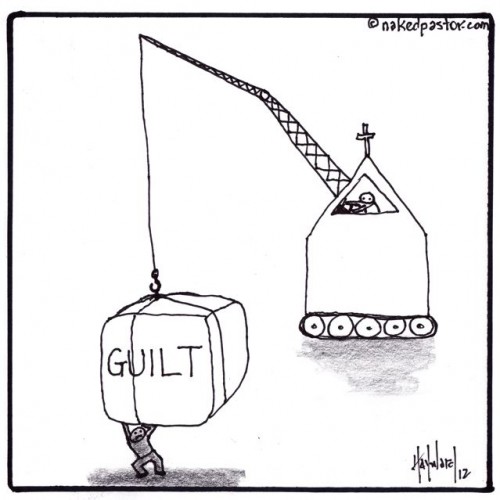Here’s an excellent article on freedom from heavy religious loads, like Jesus said in Matthew 11:28 (Message) – “Are you tired? Worn out? Burned out on religion? Come to me. Get away with me and you’ll recover your life. I’ll show you how to take a real rest. Walk with me and work with me—watch how I do it. Learn the unforced rhythms of grace. I won’t lay anything heavy or ill-fitting on you. Keep company with me and you’ll learn to live freely and lightly.” (MSG translation)
God’s Love for Us Takes Away Our Fear, Guilt, and Self-Condemnation
We begin life very self-centered; as infants we are totally dependent, so we are only interested in having our personal needs met. Only later do we recognize other individuals and begin to consider their needs.
However, our process of socialization is not smooth. Along the way are disappointments, conflicts, and misunderstandings; we are hurt by people in various ways so that we develop fears, defense mechanisms, and emotional scars. We exhibit unpleasant personality features that push other people away. To a lesser or greater extent, we find ourselves lonely and alienated.
We also come to realize that through our attitudes and behavior we hurt other people as well—whether we intend to or not, and knowing this usually causes feelings of guilt and self-condemnation. Even if we hurt people on purpose we know it is wrong because we don’t want people to do such things to us.
Pain. Fear. Alienation. Guilt. These are the feelings we carry.
Image credit: Guilt Crane by David Hayward–nakedpastor.com
Often the People of the Church Make Things Even Worse
Does this seem to describe you? Perhaps this is not your experience, but most of us can identify. Our ability to relate well to other people is often hampered by our continued self-centeredness along with our pain of being misunderstood, mistreated, and otherwise wounded—sometimes viciously.
Some church people make the situation worse. We are told that God is angry and disappointed with us and that he cannot bear to look at our sinfulness. We are worthless worms or like filthy rags. We are told further that there is nothing we can do to remedy the situation.
Even after we begin to follow Jesus, we are constantly told that we don’t measure up and that if we fail to live according to the standards we are in danger of losing everything and being punished in hell fire for eternity to satisfy God’s justice. We hear frequently how bad and worthless we are in the eyes of God.
All this judgment, condemnation, and shaming have an effect on us. After being demeaned, disdained, and demoralized by the people of the church and becoming convinced that neither they nor God really loves us for who we are, we sometimes find that we don’t love ourselves very much. Thinking that God is unhappy and disappointed with us affects our self-image and leads to our unhappiness and self-destructive behavior.
But it doesn’t have to be this way.
Jesus Brings Us Good News about Us
If we have too often heard the message that we are not lovable and that even God is angry and disappointed in us, there is another who tells us a different story. Jesus shares with us that the Father is not angry and harsh with us (click to read), but loves us unconditionally.
This is Good News! When we are twisted with emotional scars, low self-esteem, and self-destruction, it is Very Good News to learn the Father loves us so much; it frees us from fear, guilt, and self-condemnation.
When other people do not find us lovable and we don’t even love ourselves adequately, we learn that the Father—the one who knows us best of all—disagrees. He loves us; and when we realize this we can begin to love ourselves more appropriately. Yes! We are imperfect. Yes! We need help to become better. But the Father accepts us just the way we are. Rather than despising and berating us for our shortcomings—no matter how severe they might be—the Father understands us, and he understands why we are as we are.
The Father perceives us far more clearly and accurately than the best trained counseling psychologist. He knows us better than we know ourselves. He knows our defensiveness, our personality traits, our motivations, and our true desires to be better than we find ourselves to be. And he wants to heal our alienation and our feelings of aloneness.
Loving Ourselves Properly Leads to the Ability to Love Others Properly
We are told that we should love others as we love ourselves, but if we do not love ourselves then we cannot truly and fully love other people. We might feel helpless, hopeless, and beaten down, but we become able to love ourselves when we see ourselves the way the Father sees us. And how does the Father see us? He sees us as individually valuable and lovable. He does not cast his eyes away from us in disgust but embraces us in love and kindness. He desires our happiness and reconciliation with him, ourselves, and other people. He wants the very best for each of us.
This is how the Father loves us; and when we see ourselves as he sees us we can begin to love ourselves. And once that happens, we can see other people the way the Father sees them and begin to love them as we now love ourselves. This is another process of reconciliation.
Then Why Do I still Feel Guilty?
Even after hearing this Good News, perhaps you still feel fearful and/or guilty. This is understandable because this post is only an announcement of the Good News; it is not an explanation. We will discuss that next time.
Here’s the link to the original article – or click the picture below – in case you want to follow on to the next article:

